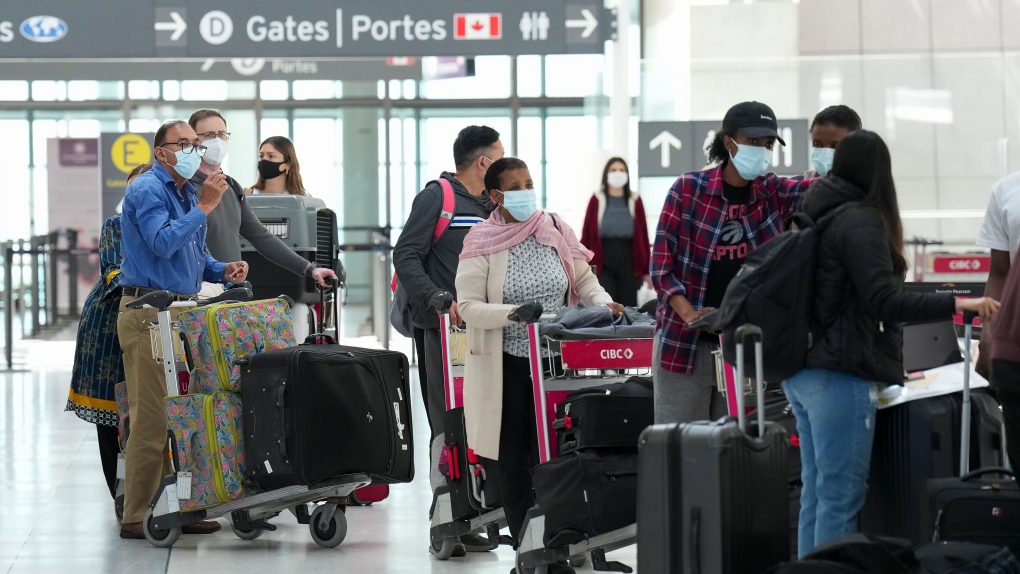
OTTAWA – The federal government of Canada is bringing back mandatory random COVID-19 testing for air travellers coming into Canada, starting July 19.
A little more than a month after pausing the measure, the Public Health Agency of Canada (PHAC) announced Thursday it will be re-implementing random testing for fully vaccinated air travellers arriving into the country at four major Canadian airports: Vancouver, Calgary, Montreal and Toronto.
The testing will be conducted offsite, either at in-person appointments at “select testing provider locations and pharmacies,” or using virtual appointments and self-swab tests. The ArriveCAN app will make the random selections, and travellers will receive an email within 15 minutes of filling out their customs declaration, detailing how they can arrange their tests.
Travellers will then have to organize how and where to complete their test with a designated test provider at no cost, whether that be making an in-person testing appointment or picking up a test to self swab during a virtual appointment.
The mandatory random testing only applies to fully-vaccinated travellers. Unless exempt, unvaccinated travellers will still have to test on days one and eight of their mandatory 14-day quarantine. If a fully-vaccinated traveller tests positive, a 10-day isolation is required, regardless of the province or territory in which the traveller resides.
Mandatory random testing continues at land border points of entry, the government added.
“We are going to be able on an ongoing basis to keep monitoring the entrance of variants, and where those variants come from, and monitor the situation at the borders, which we know is key to protect the health and safety of Canadians,” Health Minister Jean-Yves Duclos said in an interview on CTV News Channel on Thursday.
Transport Minister Omar Alghabra said random testing at airports was only put on pause to ease airport bottlenecks and wait times, but moving testing offsite will allow the government to bring back the measure.
He said at a press conference Tuesday the five-week suspension of random testing gave the government time to sort out the logistics of off-site testing and to switch to an automated system of random selection for travellers who will be tested.
“It is critical as an early warning system for our public health agency, for health care in Canada, and for the protection of the health of Canadians that we maintain this early warning system to help us and inform us on what type of measures and policies that are needed,” Alghabra said.
But some are skeptical whether reinstating the random testing — regardless of at airports or offsite — will help reduce wait times for travellers.
“There was no science shared to test fully vaccinated travellers, no science shared to pause the testing, and no science shared about re-establishing the random testing,” wrote transport critic Melissa Lantsman in an email on Thursday to CTVNews.ca. “Once again, the Liberal government is playing political games that will make our already congested and delayed airports and travel even more inconvenient for travellers without actually keeping Canadians any safer.”
“Unnecessary policies like random testing and the ArriveCAN app are hurting Canada’s recovery,” she also wrote.
NDP health critic Don Davies said he supports re-introducing measures to detect certain variants of COVID-19 and to trace how they’re getting into Canada.
“As the Liberals have not always applied these measures in an effective or efficient manner, it is important to ensure that any random testing program for international travellers is situated offsite as many transportation stakeholders have called for,” he wrote in an email to CTVNews.ca on Thursday.
According to Duclos’ office, PHAC will follow up with travellers to ensure they’re completing their tests, and issue warnings — plus possible fines — for travellers who don’t comply.
Approximately four or five per cent of travellers entering Canada will be selected for random testing, providing a sample of the overall population, the minister’s office told CTV News.
There is no change at land borders, where mandatory random testing was never put on pause.







